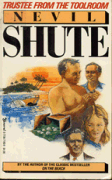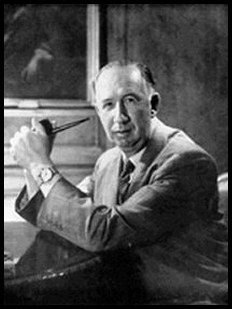and this sets the scene for Shak Lin to move on to tour the various airfields before he gets too ill do any more. At one of these Tom Cutter is passing through and hears Shak Lin take as his thesis the Mingala-thut, the Buddhist version of the Beatitudes, again connecting two religions.
Chapter 7 has yet another quote from Hassan by James Elroy Flecker when Shak Lin has to face death and Tom Cutter is having to face up to what or who Shak Lin is. Various people start to describe him as divine and three times Tom Cutter denies any thought of this where the author is linking this happening with the three denials of Christ by Peter.
Then we have the Sheikh of Khulal wanting to leave an enormous amount of money to Shak Lin, El Amin, as he calls him. He believed that El Amin had done more in recent years to draw men back to God....he had shown them the folly of their ways. His teaching was a firm rock to which men could cling in a changing world, because it was teaching of God. It did not seem important to the sheikh that El Amin shared his teaching with men of other creeds, with Buddhists and with Hindus and with Sikhs. He was teaching of God and God knew best. (my emphasis). As far as Islam was concerned El Amin had ideas that were refreshing and bringing up-to-date the old tenets of Islam without in any way destroying their original purity.
In The Wet has as its prologue a verse from the hymn written by C.A. Alington, Headmaster of Shrewsbury School, which was mentioned at the beginning of this piece. Then the person telling the story is a clergyman working in the outback of Australia. Here we have this clergyman struggling with what would appear to be re-incarnation. At the end, after Stevie has died, the Revd. Roger Hargreaves suggests the inscription on Stevie's tombstone should be a verse from the Wisdom of Solomon "having been a little chastised they shall be greatly rewarded, for God proved them and found them worthy of Himself" and then when he is conducting a baptism of a child who is to be called David Anderson, the name of Stevie in his re-incarnation, the words in the service seem to have a special meaning when they say "Give Thy Holy Spirit to this infant, that he may be born again, and be made an heir of everlasting salvation". Then this clergyman writes at the end of the story that he feels honoured, to have been involved and to know what Stevie will do in his later life and he is not surprised that God has called Stevie "because it is the way of God to deal with poor and humble men". The whole story shows a deep understanding of the work of a clergyman in the outback. It is also worth noting that one of the qualifications for one of the seven votes that the story tells us Australia had, was to be an official of a recognised Christian Church.
At about this time Nevil Shute wrote his autobiography Slide Rule. Here he quotes a poem by E.F.A. Geach, which he says epitomises those years before the First World War....and that this poem has pleased him for nearly thirty-five years. So if anything tells us what he believed then this should be included:-
Round the next corner and in the next street
Adventure lies in wait for you.
Oh, who can tell what you may meet
Round the next corner and in the next street!
Could life be anything but sweet
When all is hazardous and new?
Round the next corner and in the next street
Adventure lies in wait for you.
Next comes Requiem for a Wren.
In Beyond the Black Stump he has Stanton Laird leafing through a Gideon Bible found in his hotel drawer picking texts here and there and finding that this book had "skads and skads of messages if you only bothered to look". On another occasion he comes up with a quotation from St Paul's letter to the early Roman Church (Romans chapter 8 verse 38) which Nevil Shute would have heard read at the many funeral services he attended in his latter days in the army. Towards the end of the story when Stanton Laird is once again puzzled about what to do we are told "He had looked for a message in the Book, and he had got it with a vengeance".
Then comes On the Beach. Here we have prophecy. Nevil Shute is saying like the prophets of old 'if you go on like this then this is what will happen'. Here he is even questioning where technology is leading. Previous examples of prophecy are to be found in What happened to the Corbetts? saying what would happen to civilian populations in modern


